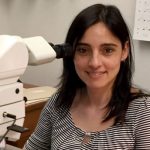- Ovarian and endometrial cancer
- DICER1 syndrome
- Cancer cell of origin
- Cancer models
- Therapeutic vulnerability
- Genomics
- Oncogenic signaling
- Cancer metabolism
Research Program
The overarching theme of my research program is to dissect mechanisms by which genetic and epigenetic events drive malignant transformation and subsequent progression to a poorly differentiated and highly aggressive state that inform the development of prevention and targeted therapeutics. Two major types of cancers we study include SWI/SNF-mutant cancers and DICER1 syndrome-associated cancers.
The SWI/SNF chromatin remodeling complex members are mutated in ~25% of all human cancers, ranking it among the most highly mutated protein complexes in cancer. The understanding of their role in cancer initiation and progression is incomplete. Studies from the past decade have identified gynecologic cancer, particularly ovarian and endometrial cancers, as great models to study the roles of SWI/SNF complexes in tumorigenesis. SWI/SNF mutations can occur at different stages of gynecologic cancer development and may function as either a driver event, a transformation-permissive event or a progression event. These includes a) inactivating mutations of SMARCA4, occur as a germline event and function as a classic tumor suppressor and key driver in small cell carcinoma of the ovary, hypercalcemic type (SCCOHT); b) ARID1A inactivating mutations occur as a transformation-permissive event in the development of endometriosis-associated ovarian and endometrial cancers; and c) inactivation of SMARCA4, SMARCB1 mutations or ARID1A/ARID1B dual inactivating mutations in dedifferentiated/undifferentiated cancer of ovary and endometrium (DD/UDEC) as cancer progression events. However, the context-specific roles of SWI/SNF mutations in the initiation and progression of ovarian and endometrial cancers is far from being fully understood. Since most SWI/SNF-mutant cancers are highly aggressive and most of these genetic alterations result in protein loss that is not directly targetable, identifying druggable vulnerabilities specific to SWI/SNF deficiencies remains an unmet clinical need.
DICER1 tumor predisposition syndrome (DTPS) is an autosomal dominant tumor predisposition syndrome caused by heterozygous germline loss of function pathogenic sequence variants in the DICER1 gene, which encodes a microRNA (miRNA) processing enzyme. Key cancer sites are lung, brain, gynecologic tract, kidney and thyroid. Most DTPS cancers are sarcomas; the high-grade DICER1 sarcomas have poor outcomes and are challenging to treat: biology-informed novel treatment options are much needed. It has been proposed that the histologic similarities of DICER1-sarcomas, regardless of their anatomic sites, implies biological relatedness and the potential for generalizable therapeutic solutions. In DTPS, a hypomorphic missense mutation restricted to the DICER1 RNase IIIb domain is the usual second event in the tumors. These focal hotspot mutations change metal-binding residues essential for RNase IIIb endonuclease activity, resulting in RNase IIIb-defective proteins as the only expressed form of DICER1 in DTPS cancer. It is unknown how selective loss of RNase IIIb activity drives oncogenesis and how to treat them.
My research will utilize patient samples and genetically engineered mouse models along with their derivative cell lines and organoids as well as leading-edge methods including genome editing, genomic, single cell omics, proteomics, functional genomics and drug screening to interrogate the underlying mechanisms supporting tumorigenesis in lethal gynecologic cancers and DICER1 sarcomas to uncover therapeutic vulnerabilities to inform the development of novel therapeutic strategies for managing the hard-to-treat cancer types.
Clinical Service
Current Projects In My Lab Include












































